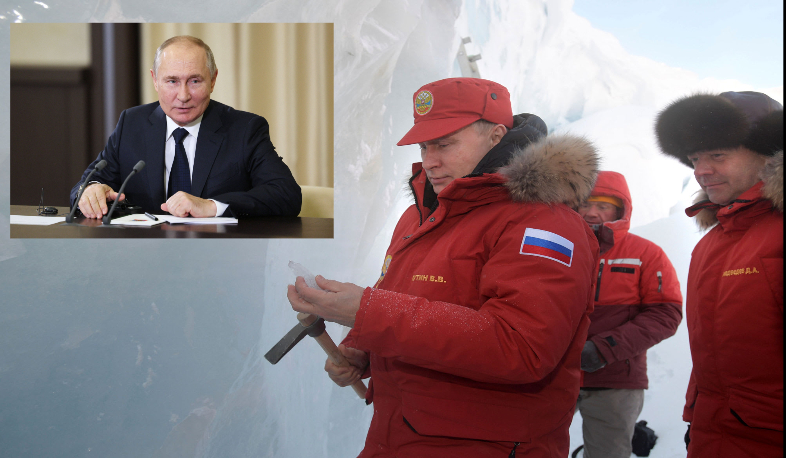In a move that has stunned the global community, Russia has discovered an estimated 511 billion barrels of oil beneath the Antarctic seabed—a quantity that could radically reshape the world’s energy map and geopolitical landscape. The find, located under the Weddell Sea off the coast of Antarctica, represents one of the largest untapped hydrocarbon reserves on Earth.
Russia’s announcement has sparked sharp reactions from the international community, especially the west who are now raising legal and environmental concerns. The Discovery has now introduced a new battleground in the East-West geopolitical rivalry.
After the discovery emerged—reported by Rosgeo as approximately 511 billion barrels—the Russian government maintained that no exploitation was planned, emphasizing compliance with the Antarctic Treaty, and framing all activity as strictly scientific. However Russian President Valdimir Putin has approved a program to develop the oil field.
Putin’s approval reflects a move from diplomatic caution to resource assertion. Russia may now look to work with BRICS partners—notably China and India—to pursue development plans
The Discovery and its Implications
According to Russian state geological agency Rosgeo, seismic mapping carried out over 4,400 km of undersea terrain revealed the potential for massive oil reserves. This quantity rivals the combined known reserves of OPEC heavyweights and is nearly twice that of Saudi Arabia. The area falls within the British Antarctic Territory, which is also claimed by Argentina and Chile, adding a complex layer of territorial dispute to the already volatile situation.
While Russian officials maintain that the activities were strictly scientific, the nature of the surveys—similar to those used in oil and gas exploration—has led to suspicion among Western nations.
Moscow has characterized the mission as compliant with the 1959 Antarctic Treaty, which bans military activity and resource exploitation in the region. Rosgeo emphasized the “scientific” nature of its research, insisting it was not conducting any resource extraction or violating international agreements.
However, experts such as Prof. Klaus Dodds of Royal Holloway University suggest the line between science and resource prospecting is being deliberately blurred. He argues that Russia’s true intent is to position itself for future resource claims, especially with the Antarctic mining ban up for review in 2048.
This resource discovery, coming amid increasing Western sanctions against Russia over its ongoing conflict in Ukraine, may also be part of a broader strategy to secure long-term energy leverage independent of traditional global markets.
The response from Western governments has been swift and wary. The UK’s Environmental Audit Committee voiced concern that Russia could be violating the spirit, if not the letter, of the Antarctic Treaty, and urged international bodies to investigate the nature of the seismic surveys.
Furthermore, the discovery raises diplomatic red flags due to overlapping territorial claims in the region. Argentina and Chile, both of which lay claim to portions of the British Antarctic Territory, have yet to formally respond, but tensions are expected to rise.
Western environmental groups have also condemned the discovery. Many fear this could lead to the eventual industrialization of one of Earth’s last untouched ecosystems—a region vital to planetary climate regulation.
Geopolitical Tensions
The 1991 Madrid Protocol, part of the broader Antarctic Treaty System, prohibits all mineral resource activity except for scientific research. However, this ban is set to be reviewed in 2048, and some fear Russia is laying the groundwork for a post-treaty resource grab.
From an environmental standpoint, tapping into Antarctica’s reserves would carry its own consequences. The region plays a vital role in stabilizing the Earth’s climate. Any large-scale extraction effort would have its own challenges.
This discovery could trigger a geopolitical arms race in Antarctica. Already, China has ramped up its Antarctic presence with the construction of a fifth research base, and is reportedly backing Russia’s stance on Antarctic governance. The West, meanwhile, is expected to reinforce diplomatic and legal pressure to preserve the continent as a global commons.
If extraction were ever permitted, whoever controls Antarctic oil could reshape global energy markets, with major implications for energy security, pricing, and political influence.
Russia’s Antarctic oil discovery has added fuel to an already simmering global rivalry. While the 511 billion barrels of oil may remain untapped for now, the mere knowledge of their existence has begun to shift diplomatic, environmental, and strategic postures around the world.
Meanwhile Russia has already struck jackpot, now it’s adversaries will either attempt to block the usage or stake a claim. If not they too will be looking to strike their own black gold. For now Putin has stolen a huge March on its rivals and will be even looking to get China and India involved to reinforce the BRICS alliance further.
